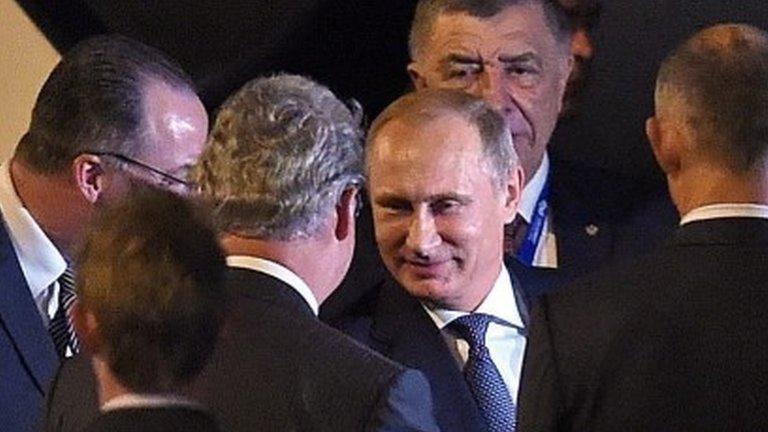How sanctions against Russia are hitting UK businesses
- Published
Andrew Hodgson from SMD talks to the BBC's Peter Day about how the robots work.
Western leaders are prepared to tighten sanctions further against Russia, according to the UK foreign office.
Introduced after Russia's intervention in Ukraine and the annexation of Crimea, sanctions imposed on Russia - and then by Russia in retaliation - are already making life difficult for some UK businesses.
At SMD, a specialist engineering firm in Newcastle-upon-Tyne, they make sophisticated robots which operate on the seabed, doing the job of deep-sea divers.
These are used for developing oil fields all over the world.
SMD relies on its exports, and one fifth of its market is in Russia.
That stopped when targeted economic sanctions against Russia by the US and the EU were announced at the end of July.
These banned trade with certain sectors in Russia: defence, some banking, and the oil and shale gas industry; as well as with key individuals.
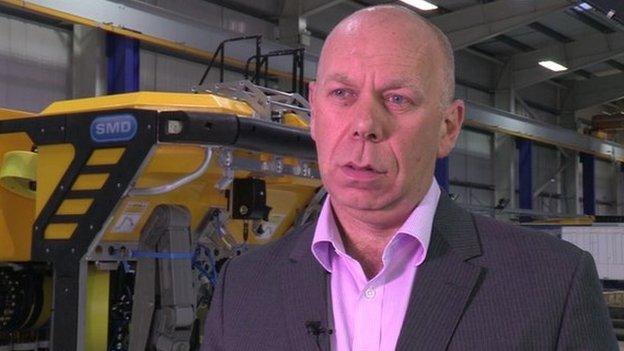
Andrew Hodgson at SMD says sanctions may disrupt his orders for several years
Andrew Hodgson, chief executive of SMD, highlights the damage to his business, especially as it can take three to four years to win a major sub-sea contract.
"Imagine we're a 500 employee business and 20% of your business doesn't exist, that's 100 jobs and obviously we've been working hard on the technology," he says.
"We've got a number of significant projects in the pipeline, which we've been working on over a number of years with Russia, which clearly are just in abeyance now and they've just stopped," Mr Hodgson points out.
Hidden damage
In a typical year SMD would sell £20m pounds worth of equipment in Russia, to both the navy and the off-shore oil industry.
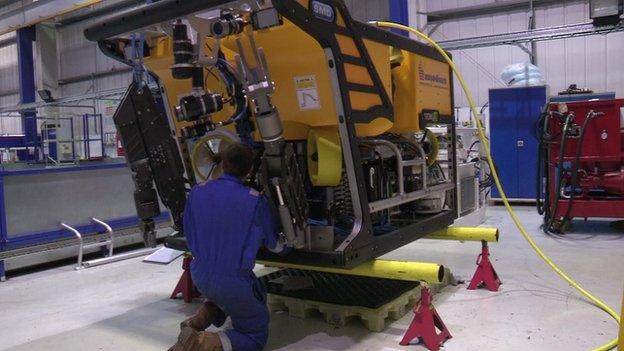
About 20% of SMD's 500 jobs could be at stake if alternative markets are not found
Fortunately it is a company with several different export markets, and it expects to maintain its workforce by selling elsewhere.
Mr Hodgson says he understands the reasons for the sanctions, but the loss of Russia means the firm won't continue the fast growth and expansion it has seen in the past few years.
He claims SMD is not the only company to be hit by these sanctions, and that many others are reticent about admitting the impact these are having.
"I can't quote who they are, but I've been speaking to some of the large players in our sector who provide other equipment, and it's having a significant hit on their business," Hodgson says.
Russian retaliation
But it is not just sanctions imposed by the West that are hitting companies.
In August Russia retaliated by banning imports of some agricultural food from the US and the EU.
This included mackerel from Scotland.
The Scottish mackerel industry has had a long history of trade with Russia, and the Soviet Union before that.
Skipper Alex Wiseman, who is also chairman of the Scottish Pelagic Fishermen's Association, says at one time Russia was their only market for mackerel so the import ban came as a huge shock.
He says prices for mackerel fell sharply this season as the effect of a larger mackerel fishing quota this year was compounded by the Russian ban.
"We were watching the situation but you never think these things are going to affect you directly," says Mr Wiseman.
Seeking new buyers
At Peterhead in Aberdeenshire, Sinclair Banks is the general manager at Lunar Freezing, a mackerel processor.
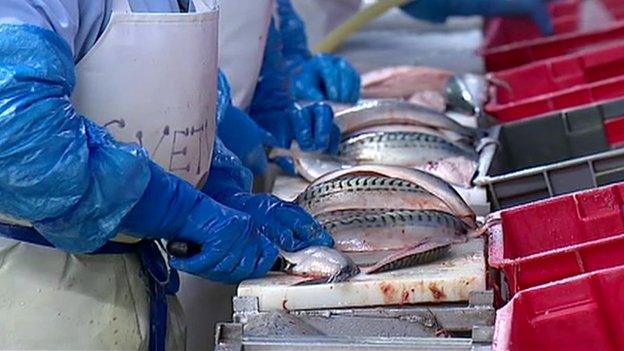
Mackerel processed at Lunar Freezing is now heading for South East Asia not Russia
The firm used to sell 16% of its mackerel to Russia, and has now had to fill that gap.
It has now made up much of the shortfall by selling to South East Asian markets instead.
"We had to make a lot of effort to try and get more product into that market," says Mr Banks.
"So we had to go to Japan for two weeks, and visit China. Nigeria has been a good market for us as well, Western Europe and Israel [too]. We've sold into all of these countries."
However, he believes selling in Russia in the future will be extremely challenging as the importers there have turned to countries not affected by the ban.
"If the sanctions are lifted it will be difficult to get that market back," says Mr Banks.
"The market in Russia has adapted to the product in Faroe, Iceland and Greenland."
More sanctions ahead?
So have the sanctions imposed by the EU countries backfired?
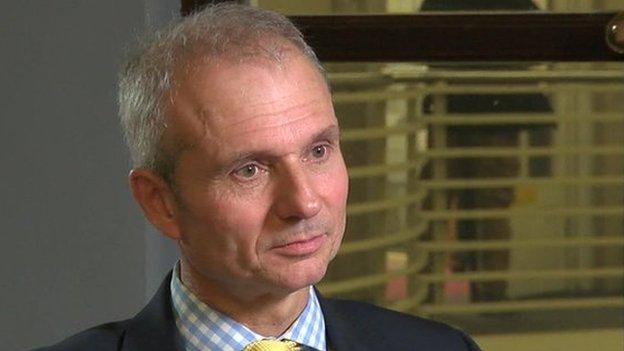
Europe minister David Lidington says there may be more anti-Russian sanctions ahead
The foreign office minister for Europe, David Lidington, recognises that some UK companies have indeed been hit.
"There is undoubtedly a cost to us and I don't think anybody from the prime minister down has pretended otherwise, just as there is for German companies, French companies, Italian companies, [and] American companies, whose governments have also introduced sanctions," he explains.
However he says the sanctions are necessary given Russia's intervention in Ukraine and annexation of Crimea. The West, he says could in fact take more action.
"Sanctions could be tightened further - that depends what happens in Russia and Ukraine," he warns.
"So far when sanctions have been tightened it has been in response to aggressive action by the Russians or by Russia's reneging upon international agreements she has entered into."
The government, he says, is trying to help those companies which have lost their Russian customers to find new markets.
However, there are no guarantees of new contracts and there is no financial help on offer.
In Business is broadcast on BBC Radio 4 at 20:30 on Thursday, 27 November and is repeated at 21:30 on Sunday, 30 November. It is also available on iPlayer.
- Published25 November 2014
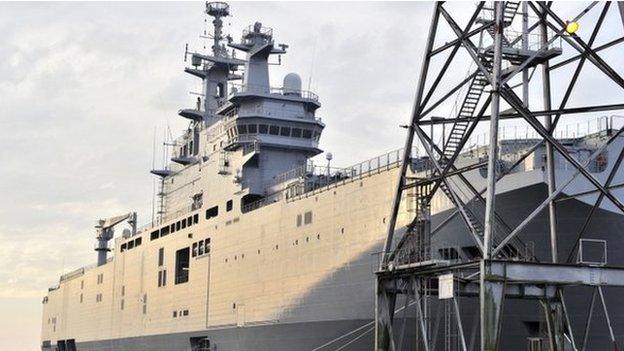
- Published24 November 2014
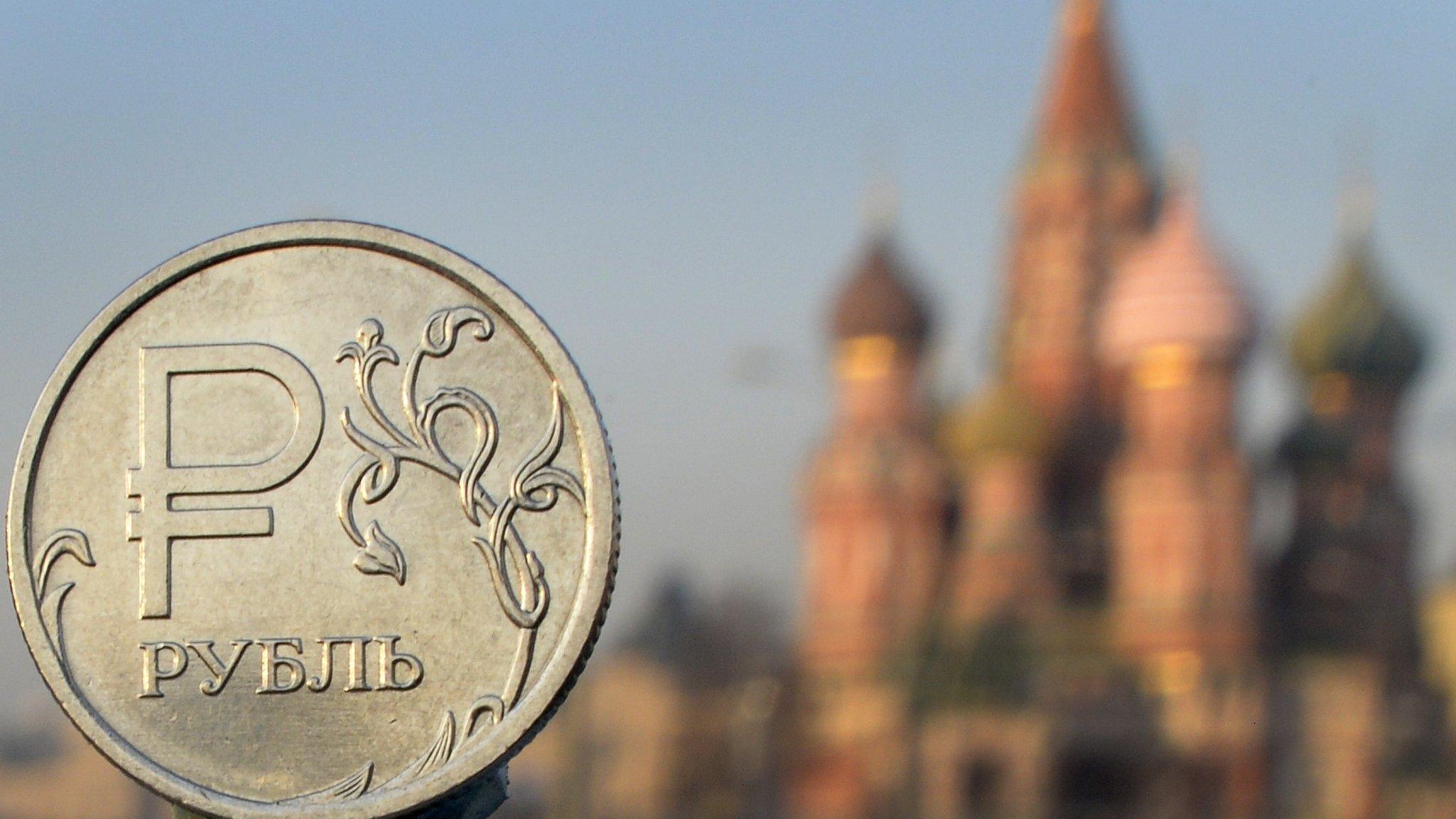
- Published14 November 2014
